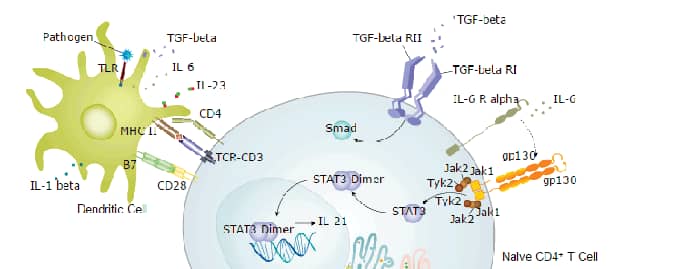Human CD4 Alexa Fluor® 350-conjugated Antibody Summary
Lys26-Trp390
Accession # P01730.1
Applications
Please Note: Optimal dilutions should be determined by each laboratory for each application. General Protocols are available in the Technical Information section on our website.
Preparation and Storage
- 12 months from date of receipt, 2 to 8 °C as supplied.
Background: CD4
CD4, also known as L3T4, T4, and W3/25, is an approximately 55 kDa type I transmembrane glycoprotein that is expressed predominantly on thymocytes and a subset of mature T lymphocytes. It is a standard phenotype marker for the identification of T cell populations (1). Mature human CD4 consists of a 371 amino acid (aa) extracellular region containing four immunoglobulin-like domains, a 22 aa transmembrane segment, and a 40 aa cytoplasmic domain (2). Within the ECD, human CD4 shares approximately 52% aa sequence identity with mouse and rat CD4. CD4 is expressed along with CD8 on double positive T cells during their development in the thymus. Either CD4 or CD8 expression is then lost, giving rise to single positive (SP) CD4+ or CD8+ mature T cells (3). CD4+ SP cells, also known as T helper cells, further differentiate into multiple subsets of CD4+ cells including Th1, Th2, Th17, Tfh, and Treg cells which regulate humoral and cellular immunity (4). CD4 is reexpressed on circulating CD8+ T cells upon activation and contributes to their cytotoxic effector activity (5). In human, CD4 is additionally expressed on macrophages, neutrophils, monocytes, NK cells, and neurons and glial cells in the brain (6-9). Similar CD4 distribution between species cannot be assumed as demonstrated by its presence on macrophages in human and rat but not in mouse (6). CD4 binds directly to MHC class II molecules on antigen presenting cells (10). This interaction contributes to the formation of the immunological synapse which is focused around the TCR-MHC class II-antigenic peptide interaction (1, 11). Palmitoylation of two cysteine residues in the cytoplasmic tail of CD4 promotes the localization of CD4 in lipid rafts and its ability to augment TCR signaling via activation of the tyrosine kinase Lck (12). CD4 also functions as a chemotactic receptor for IL-16 and, in human, as a co-receptor for the gp120 surface glycoprotein of HIV-1 (7, 13-15).
- Vignali, D.A.A. (2010) J. Immunol. 184:5933.
- Maddon, P.J. et al. (1985) Cell 42:93.
- Alarcon, B. and H.M. van Santen (2010) Sci. Signal. 3:pe11.
- Wan, Y.Y. and R.A. Flavell (2009) Mol. Cell Biol. 1:20.
- Kitchen, S.G. et al. (2005) Proc. Natl. Acad. Sci. 102:3794.
- Crocker, P.R. et al. (1987) J. Exp. Med. 166:613.
- Biswas, P. et al. (2003) Blood 101:4452.
- Bernstein, H.B. et al. (2006) J. Immunol. 177:3669.
- Funke, I. et al. (1987) J. Exp. Med. 165:1230.
- Doyle, C. and J.L. Strominger (1987) Nature 330:256.
- Huppa, J.B. et al. (2010) Nature 463:963.
- Fragoso, R. et al. (2003) J. Immunol. 170:913.
- Cruikshank, W.W. et al. (1994) Proc. Natl. Acad. Sci. 91:5109.
- Klatzmann, D. et al. (1984) Nature 312:767.
- Dagleish, A.G. et al. (1984) Nature 312:763.
Product Datasheets
Product Specific Notices
This product is provided under an agreement between Life Technologies Corporation and R&D Systems, Inc, and the manufacture, use, sale or import of this product is subject to one or more US patents and corresponding non-US equivalents, owned by Life Technologies Corporation and its affiliates. The purchase of this product conveys to the buyer the non-transferable right to use the purchased amount of the product and components of the product only in research conducted by the buyer (whether the buyer is an academic or for-profit entity). The sale of this product is expressly conditioned on the buyer not using the product or its components (1) in manufacturing; (2) to provide a service, information, or data to an unaffiliated third party for payment; (3) for therapeutic, diagnostic or prophylactic purposes; (4) to resell, sell, or otherwise transfer this product or its components to any third party, or for any other commercial purpose. Life Technologies Corporation will not assert a claim against the buyer of the infringement of the above patents based on the manufacture, use or sale of a commercial product developed in research by the buyer in which this product or its components was employed, provided that neither this product nor any of its components was used in the manufacture of such product. For information on purchasing a license to this product for purposes other than research, contact Life Technologies Corporation, Cell Analysis Business Unit, Business Development, 29851 Willow Creek Road, Eugene, OR 97402, Tel: (541) 465-8300. Fax: (541) 335-0354.
FAQs
No product specific FAQs exist for this product, however you may
View all Antibody FAQsReviews for Human CD4 Alexa Fluor® 350-conjugated Antibody
There are currently no reviews for this product. Be the first to review Human CD4 Alexa Fluor® 350-conjugated Antibody and earn rewards!
Have you used Human CD4 Alexa Fluor® 350-conjugated Antibody?
Submit a review and receive an Amazon gift card.
$25/€18/£15/$25CAN/¥75 Yuan/¥2500 Yen for a review with an image
$10/€7/£6/$10 CAD/¥70 Yuan/¥1110 Yen for a review without an image






